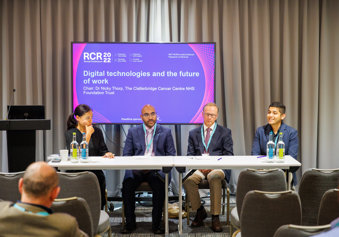
Funding for research
Funding bodies: UK sources
The RCR do not currently offer independent Clinical Research Fellowships.
Several different types of funding schemes covering a range of research areas in cancer are available.
Clinical Research Training Fellowships
These Fellowships are for outstanding post-doctorates to consolidate the research skills, and they are available for five years. Calls for proposals are regularly posted on the MRC website in a variety of disciplines.
- Developmental Clinical Study is a subset of experimental medicine where new diagnostics or devices can tested and include phase I/II trials. This leads onto the Developmental Pathway Scheme which helps the translation of fundamental research towards patient benefit (for example, taking a biomarker or imaging device into clinical practice)
The NIHR provides a range of well resourced funding streams grouped into programs, each with its own remit and application criteria.
Examples of the programs are given below but a comprehensive list is available.
This programme funds studies on cost-effectiveness in imaging technologies. There are commissioned calls which are advertised four times a year and open calls for investigator-led proposals for evaluation studies and clinical trials. There are four deadlines each year.
This programme funds regionally derived applied research projects to improve healthcare delivery to patients. Funds projects developed by health service staff in partnership with health service users which will impact on day to day practice. Up to £250,000 is available over three years.
Research training fellowships are available for 2-3 years to those who have passed their FRCR exam and have little or no research experience. The fellowship includes a salary and reasonable research expenses. Applications are considered three times per annum. Research grants are focused on the following topics:
- Maximising the health benefits of genetics and genomics
- Understanding the brain
- Combating infectious disease
- Investigating development, ageing and chronic disease
- Connecting environment, nutrition and health.
This is funded by the Medical Research Council (MRC) and managed by the National Institute for Health Research (NIHR). The EME programme is broadly aimed at supporting 'science driven' studies with an expectation of substantial health gain. The clinical studies are likely to be mostly randomised, controlled trials but other forms of evaluation appropriate for the intervention under study will also be supported. Both the EME and HTA will fund technology evaluation.
Research Fellowships of up to £45,000 for between 3-24 months is available to release experienced researchers from routine duties to undertake original research; awards are not limited to those in university appointments but excluded are those registered for degrees.
Contact: The Secretary, Research Awards Advisory Committee, The Leverhulme Trust, 1 Pemberton Row, London EC4A 3BG.
Research Prizes of £200,000 over a five-year period are awarded to young clinical and non-clinical scientists to help them to pursue their personal research interests in biomedical science or related scientific areas. The money can be spent on equipment, travel, consumables, salaries for a replacement lecturer, visiting scientists, post-doctorate or PhD students but not personal salary. Any scientist with a minimum of three and less than ten years' post-doctoral experience who is holder of university appointment or other equivalent research position, or of long-term fellowship is eligible.
Fellowships are available for research, advanced study or acquisition of a new clinical skill not available in the UK. Up to £30,000 is available to enable the applicant to spend up to one year abroad at a centre of international excellence.
Research Grants are available in research specifically aimed at benefitting older people, to include Alzheimer's disease, Macular Disease, Prostate Cancer, and Parkinson's Disease. Preference is given to applications from Lancashire (especially Lancaster and District), Cumbria, Greater Manchester, Cheshire and Merseyside areas.
Contact: Peel Medical Research Trust, Sceptre Court, 40 Tower Hill, London EC3N 4DX.
This grant funds interventional radiology research and is awarded in open competition. Full details on the BSIR website.
Postgraduate awards available for those studying higher degrees or degrees in medicine, dentistry or veterinary science at a university in the UK.
Contact: The Sir Richard Stapley Educational Trust, North Street Farmhouse, Sheldwich, Nr. Faversham, Kent ME13 OLN.
Email: admin@stapleytrust.org
Awards of up to £10,000 per year for up to three years.
Contact: Administrator, Wingate Scholarships, Queen Anne Business Centre, 28 Broadway, London SW1H 9JX.
There are many charities dedicated to specific diseases which vary in resource and offer small to large research grant support. Examples include:
- UK Clinical Research Collaboration (UKCRC) partners’ goal is to establish the UK as a world leader in clinical research. The UKCRC provides a forum that enables all Partners to work together to transform the clinical research environment in the UK. The forum promotes a strategic approach to the identification of opportunities and obstacles to clinical research and their resolution. In so doing the UKCRC aims to benefit the public and patients by improving national health and increasing national wealth.
- The NIHR Imaging Workforce Group advertises and facilitates imaging research nationally. Their website provide researchers and healthcare professionals with information, guidance and support in delivering imaging research.
- The Department of Health
- The Association of Medical Research Charities
- Alzheimer's Research Trust
- The Royal Society
Funding bodies: US & European sources
This 'Gateway to European research and development' lies on the CORDIS website. At the community level, the Union possesses three key support instruments: Cohesion policy which is funded under the Structural Funds and Cohesion Fund; the Research Framework Programme; and the Competitiveness and Innovation Framework Programme.
The NIH provides financial support in the form of grants, co-operative agreements and contracts. This assistance supports the advancement of the NIH mission of enhancing health, extending healthy life, and reducing the burdens of illness and disability. While NIH awards many grants specifically for research, they also provide grant opportunities that support research-related activities, including: fellowship and training, career development, scientific conferences, resource and construction.
Career development
Our expert advice will guide you through all stages of your career, from choosing the right specialty, to offering support through professional networks.
